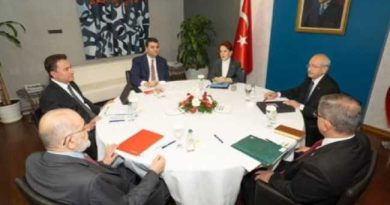Japan Pharmaceutical Company Hopeful on the Turkish Market
Japan’s Astellas, a global pharmaceutical company mainly active in urology and transplantation, is hopeful on the Turkish market despite sharp price cuts, a hot topic for the whole sector. The local branch is planning to both increase employees and offer a wider product range this year, says Piet Dury, head of Astellas Turkey. The executive also warns on a possible lack of drugs due to government’s pricing policies
The Turkish branch of Astellas, the Japan-based pharmaceutical firm, registered 70 percent growth last year despite the “serious effects” of large cuts in drug prices, according to Piet Dury, director general of the local business.
Speaking to members of the press during a meeting session of a two-day symposium on transplantation by the company in Çeşme town in the western province of İzmir, Dury recalled that Astellas was active in the local market since 2008.
The company registered a 70 percent growth rate between 2009 and 2010, he said. “By the end of these two years, the firm reached more than 45 million Turkish Liras in turnover, ranking 15th in the Astellas Europe region.”
Among the European business, Astellas Turkey has been selected as the third best subsidiary in performance, he said. “This success shows how a good decision it was to invest in Turkey.”
Speaking to the Hürriyet Daily News on the sidelines of the meeting, Dury said Turkish government’s hike in discounts imposed on drug prices has hit Astellas Turkey “seriously.”
With recent regulations over the last two years, the government hiked the institutional pharmaceutical discounts imposed on drugs. Since then, some pharmaceutical companies active in the domestic market announced layoffs and decreases in profits.
“Astellas Turkey posted a 9 percent loss in the last quarter of 2010 and more than 12 percent in 2009,” Dury told the Daily News. “You can cut drug prices, you can do it more than one time. It is possible,” he said. “But after a while, this may create a pharmaceutical desert in the country.”
Pharmaceutical business requires long-term investments, said Wim Kockelkoren, president of Astellas Europe, at the meeting. “There should be stability in a country to attract investments. These kinds of dramatic decreases are affecting investors. Cooperation between the government and the private sector is crucial,” he said.
Ranking 15th among all pharmaceutical companies across the world, Astellas Pharma reached 8 billion euros in business volume with nearly 15,000 partners around the world. “The company’s volume of investments in research and development studies has reached 1.3 billion euros in a bid to boost innovation,” Dury said.
Globally, Astellas is active in a total of six therapy fields including transplantation, urology, dermatology, oncology, pain treatment and infection, according to Dury. “In the Turkish market, we offer a total of five products in transplantation, urology and dermatology. We also conduct clinical studies here. We work hard to increase our product range in the short-term. We plan to bring innovative drugs to Turkey in the pain relief and infection fields.”
The company also has a total of five “promising” molecules in development phase in oncology that aim to meet requirements in medical treatments that are not currently being provided, said Durry. “We also plan to bring these discoveries that are in the development phase to Turkey.”
The number of employees working in Astellas Turkey is currently 70 and the company targets to increase this figure to 81 by the end of the year. It employs around 15,000 workers globally, some 3,400 of them in the European region.
Earthquake in Japan
Astellas was seriously hit by the earthquake and tsunami disaster in Japan in March, according to Dury. “We experienced a very emotional period after the disaster. However, our priority was the safety of our employees during that time. We have donated a huge amount to support their recovery. In addition, we have also supported financially the Japan Red Cross.”
Noting that a few of their facilities in Japan were damaged during to the earthquake, Dury said what is important was the well being of their employees. “Thanks to them, our facilities are still active almost as they were before the disaster. We have no problem supplying products,” he said.
Transplantation
The symposium on transplantation, one of the strong businesses of Astellas, also highlighted local health problems. Chronic renal failure is 10 percent in Turkey, according to Murat Tuncer, associate professor from Medical Park Antalya. “There are more than 60,000 dialysis patients in the country. Some 11,000 more are added each year.”
“Even though transplantation studies have improved, the problem cannot be overcome,” Tuncer said. “People think this is an expensive operation. But Turkey’s Health Ministry has revealed a revolution in transplantation. The government meets all the cost in transplantation surgeries.”
Finding sufficient donated organs remains the problem.
May 15, 2011
SOURCE: Hürriyet Daily News





